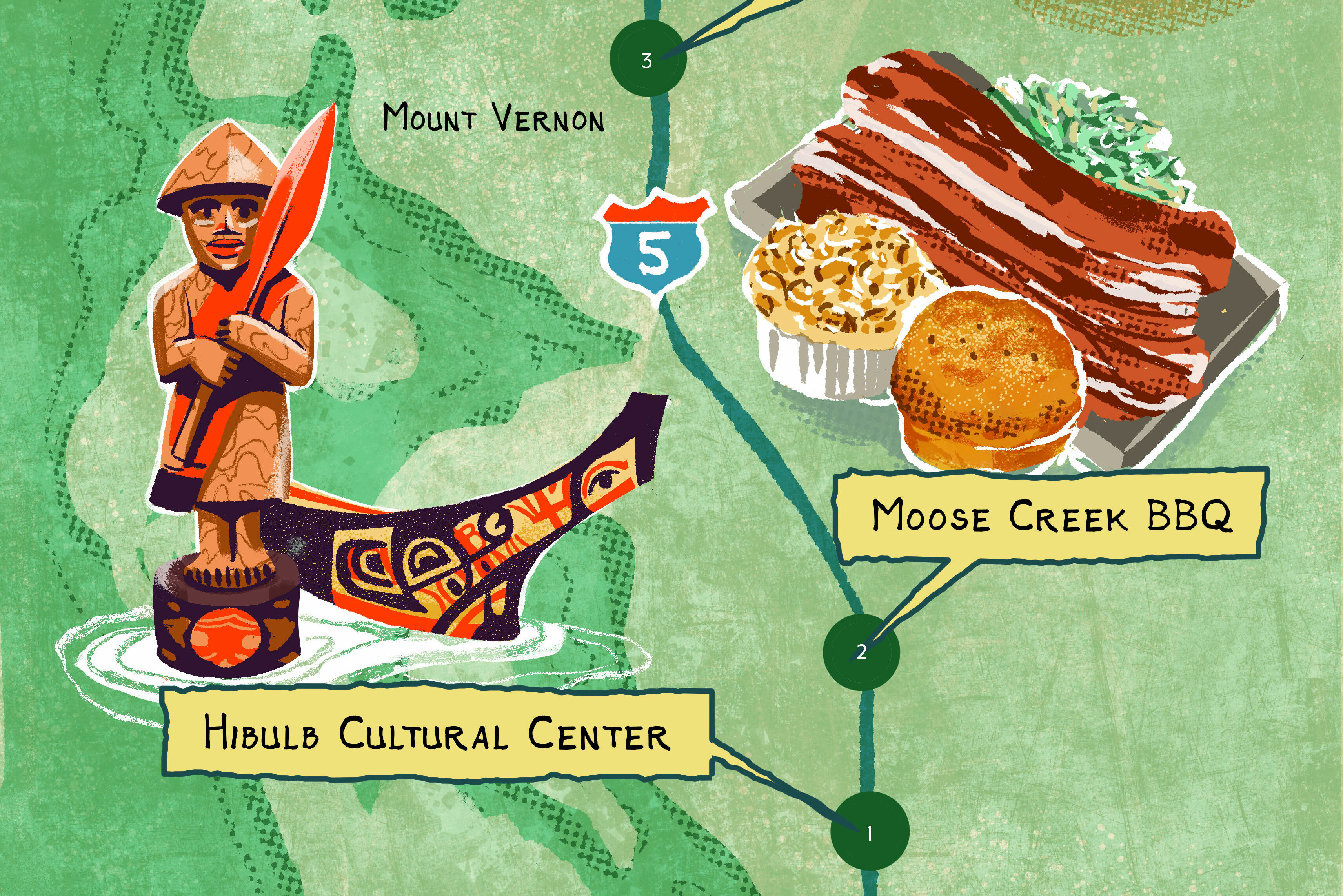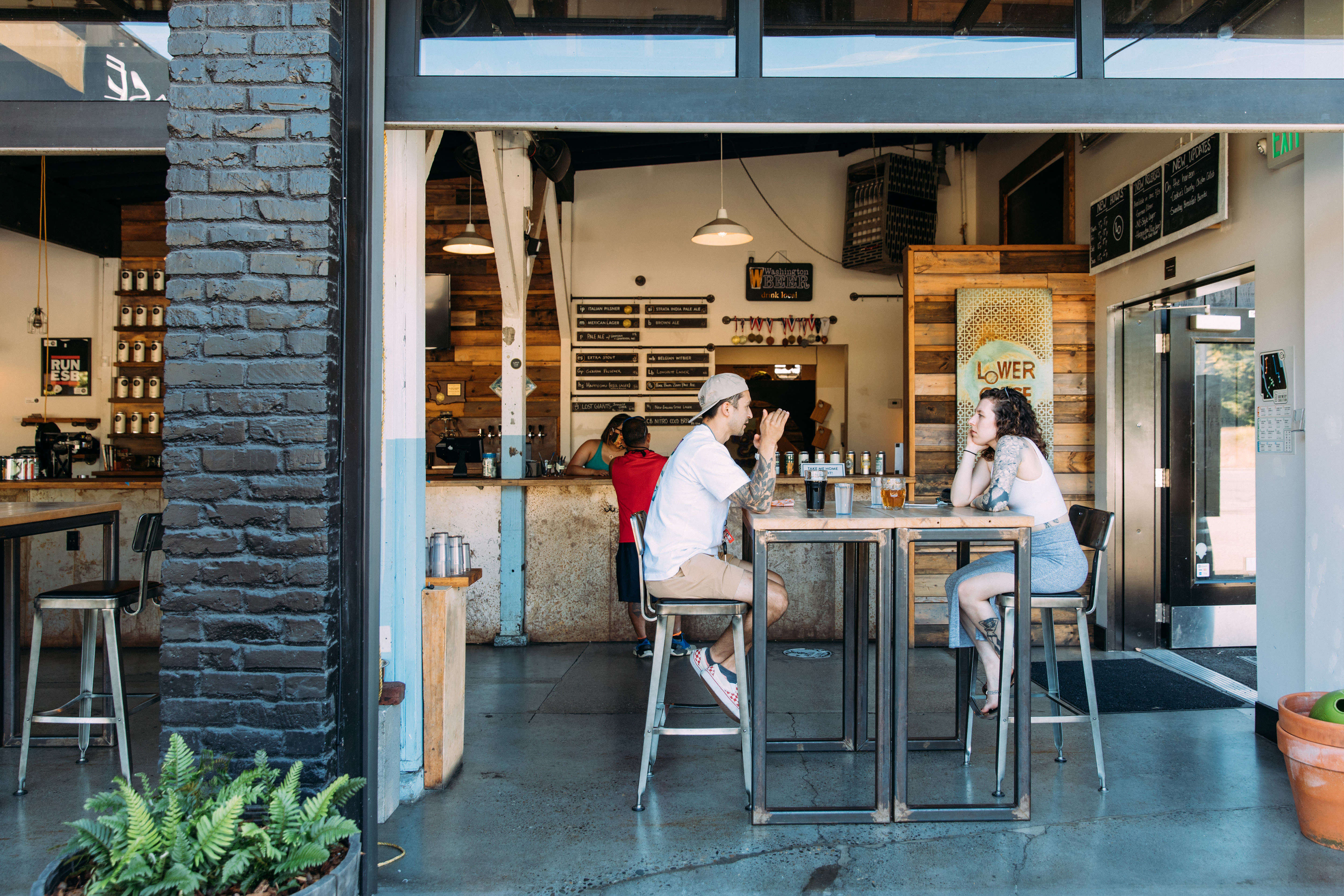
Seattle's Best Breweries
Photo: Lowercase Brewing
Due to the coronavirus pandemic, these breweries still occasionally alter their methods—switching to cans, opening on a limited basis. Best to check their websites for the latest information on safely getting a pint. And remember that drinking outside or getting something to go is significantly safer than going indoors.
Ballard (aka Seattle Beer’s Epicenter)
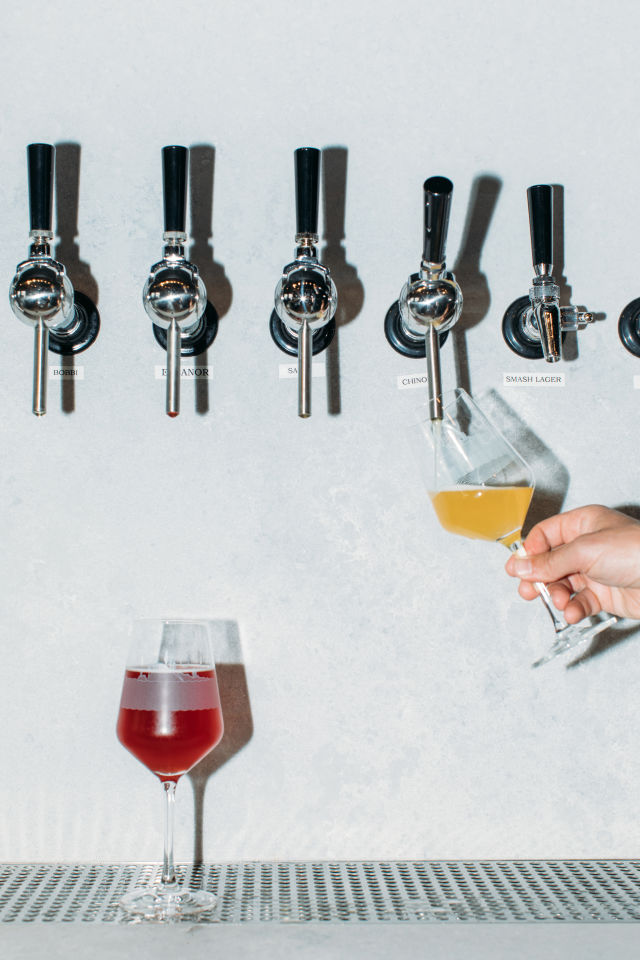
Fair Isle: all saisons, all the time.
Fair Isle Brewing
In the last half decade, most brewers have futzed around with a saison, with varying degrees of success. But Ballard’s Fair Isle makes only saisons, and with high levels of success. If some experiments go a little sideways—an elderflower-infused brew that’s more interesting than persistently compelling—plenty show the style at its delicate best, with restrained acidity and intense effervescence: beer for the champagne drinker.
Lucky Envelope Brewing
To help their brewery stand out, especially in beer-drenched Ballard, Lucky Envelope cofounders Raymond Kwan and Barry Chan decided to make ales that draw from various cultures (many with Asian elements like lemongrass or buddha’s hand citrus). But then their IPA, its hop character perched midway between fruity and resinous, won a gold medal at the Washington Beer Awards, which had restaurants and bars hungry for kegs. No matter: Last year they took home a bronze for a smoked tea helles lager.
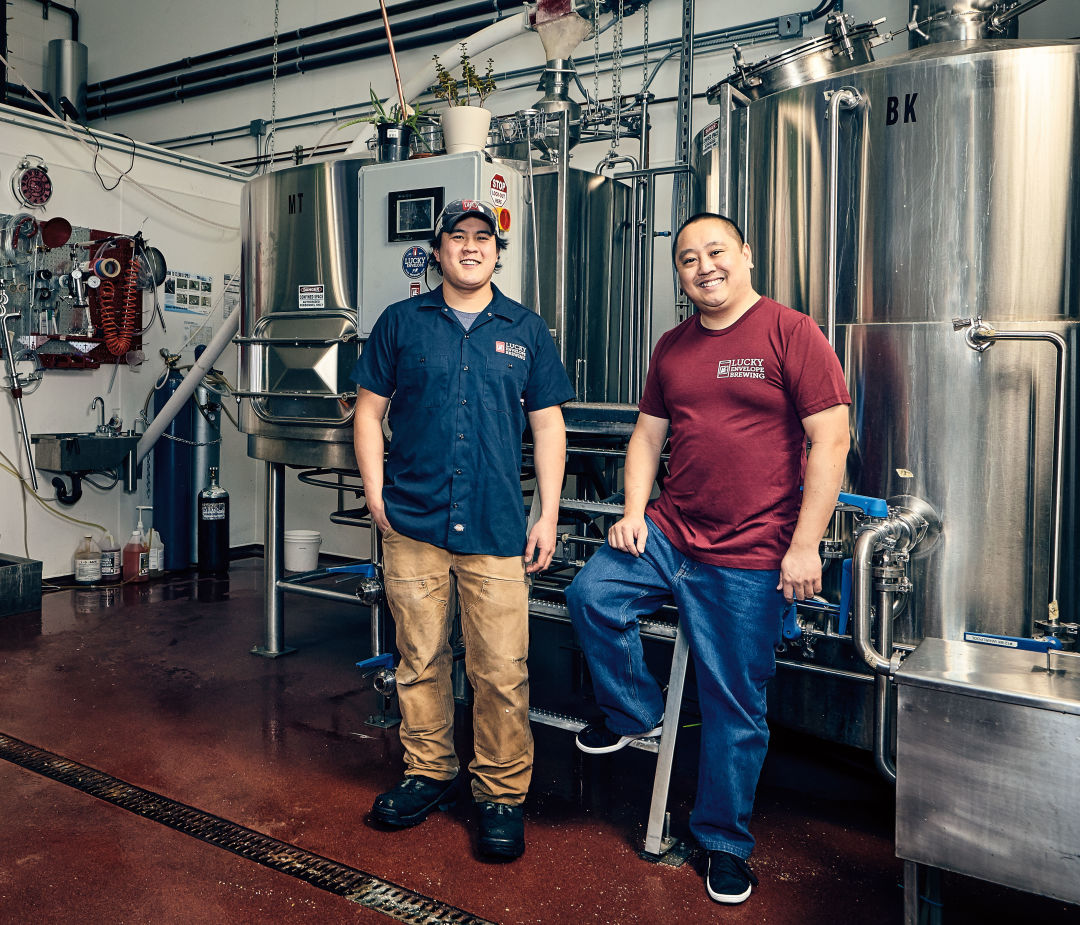
Barry Chan and Raymond Kwan named their brewery for the Chinese tradition of dispensing red envelopes of paper money for luck.
Image: Carlton Canary
Reuben’s Brews
Ballard’s brewery boom has no better ambassador than this taproom, its pair of patios an emblem of the transformation happening in these quiet industrial blocks. Reuben’s Brews has grown with a speed impressive by even Seattle’s frenzied standards, thanks to co-founder Adam Robbings’s endlessly creative cross-pollination of European beer styles and Northwest hop fervor. The tasting room’s whopping 25 taps might pour light Mexican lager next to imperial rye IPA next to imperial mole stout—and every last one will be excellent. Bottles and cans that bear the swooping cursive R logo convey Reuben’s signatures—Crikey IPA, Robust Porter, salty, sour gose—to Washington’s farthest reaches, even Idaho and Oregon.
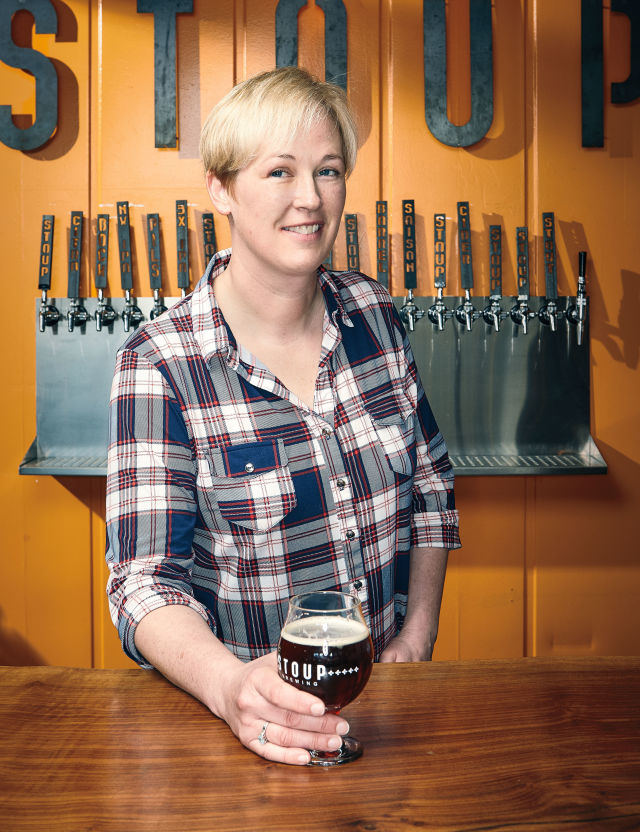
Stoup Brewing's co-owner Robyn Schumacher is a Certified Cicerone. No shock—the beer is meticulous.
Image: Carlton Canary
Stoup Brewing
Stoup quietly produces a murderer’s row of beer styles, like a traditional hefeweizen and maybe six IPAs at any given moment. Thanks to its founders’ scientific rigor, the difference between Stoup’s signature sunshine-forward Citra IPA and, say, a more traditionally bitter northwest IPA comes through with clarion certainty. While you can now snag cans at places like PCC, in normal times Stoup’s beers are best found on draft, available at bars, restaurants, or the family- and dog-riffic Ballard taproom, with its oasis of a patio and an upstairs lounge “for 21 and over humans only.”
Urban Family Brewing Company
In 2011 the Belgian-focused Urban Family Public House opened in Ballard. Since then, it’s gone through well over a decade’s worth of changes. The ownership changed. It moved to Magnolia—then back to Ballard this February. And, in the process, it found verve in the glass, shifting from pretty forgettable beers to crowd pleasing hazy IPAs and the city’s most vigorous fruited sour program. Consider, for instance, its Sacred Arrow, an imperial sour brewed with raspberries, which lands right at the puckering intersection of beer, sparkling wine, and cider.
Elsewhere in North Seattle
Big Time Brewery and Alehouse
The oldest surviving brewpub in Washington state has served up consistently good beer in the University District since 1988. Amid the classic woodworking and styles—longtime favorites are its Old Wooly Barleywine and Scarlet Fire IPA—it still pours surprisingly timely pints, like a “palesner” (brewed only with Skagit Valley pilsner malt) and a red currant and raspberry sour.
Burke-Gilman Brewing Company
This brewery is, as you might guess, just off the Burke-Gilman trail near University Village, and fittingly its beer is just what you want out of a neighborhood stop. Yes, you can grab popular pints like a hazy IPA, or geek staples like a brawny Fyodor Russian imperial stout, but you’re best off with its accessible yet interesting European-style beers—an altbier, a table saison, an exceptionally balanced Vienna lager—the sort of things you want to drink constantly. Right now that beer is best accessed via a to-go crowler (essentially a 32-ounce can), or you can post up on the midsized patio.
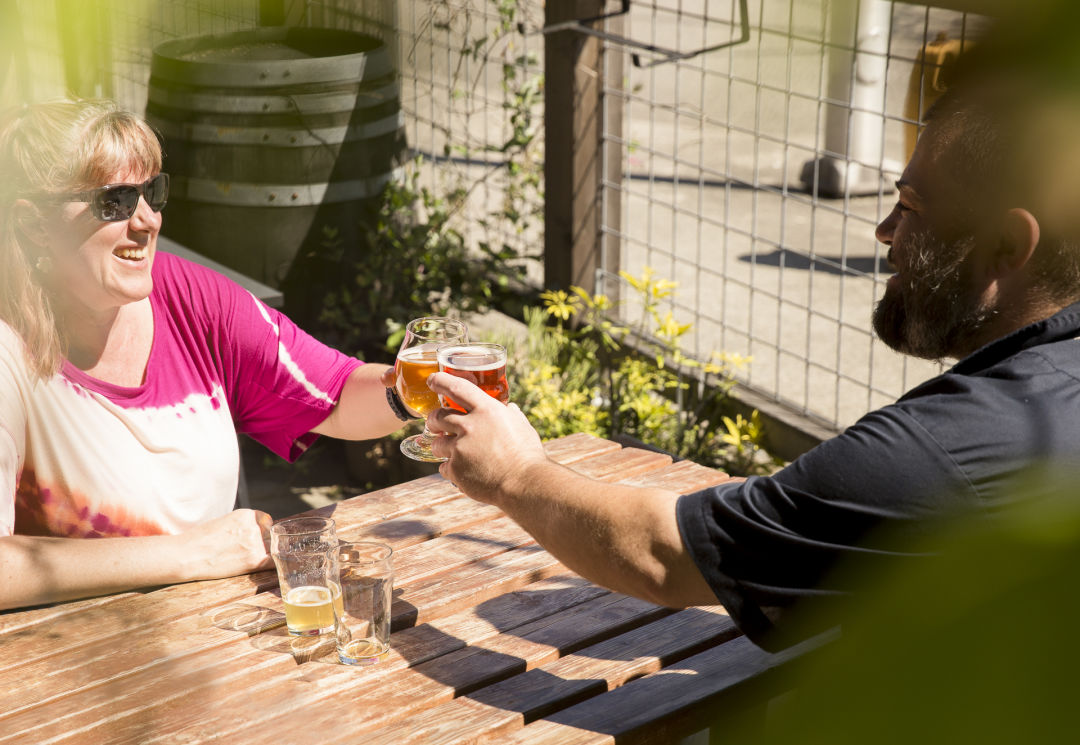
Burke-Gilman Brewing boasts a patio just off its namesake trail.
Image: Courtesy Mollie Kimberling
Floodland Brewing
The exquisite farmhouse beers—delicate, intelligent, mesmerizing—from Adam Paysse’s Fremont project Floodland bear mention on any list of city breweries. Most of its production goes to a wait-listed bottle club, but it’s occasionally on tap at places like the Masonry and the Stumbling Monk. You can also check out its pointedly austere website and sign up for the mailing list to hear about public bottle sales.
Fremont Brewing
If beer culture is about casual bonhomie, Fremont Brewing taps that vibe for all its worth. At its massive beer garden, the tables come communal (and currently socially distanced), while the tap list tends toward playful accessibility, even when cranking the flavors in a beer like an imperial oatmeal stout. You can also order online, getting standard cans, or bottlings from its Black Heron Project, which is focused on mixed-fermentation beers.
Ravenna Brewing Company
Ravenna Brewing’s beer is typified by curiosity. A vanilla porter? An oak-fermented, blackberry and boysenberry sour? A London pub ale? All present. But lately the patioed space, tucked away in a sleepy neighborhood, has been a juicy IPA hub. Luckily, these takes on the style arrive nicely balanced. See the Strata-Varius, which goes all in on the orange juice texture and abundant fruit flavors—mango, grapefruit—but complements them with a bit of resin and a fine snap of bitterness to keep things from getting cloying.
Central Seattle
Cloudburst Brewing
Beer doesn’t get more fun than this. From names (Sweater Wetter IPA, That’s Bolshevik!) to what issues from taps, Cloudburst is equal parts charm and chops. You can find it at certain bars and restaurants, but better to head to the Belltown taproom where owner and head brewer Steve Luke’s tap list unreels like a hop-addled mixtape (lately accessible via cans). That means lots of IPAs in aromatic technicolor, lots of playful excursions (brown ale cinnamon and raisins, anyone?)—and with over 300 different brews in four years, just lots of great beer.
Holy Mountain Brewing
Maybe it’s the ominous merch or the nods to old monastic brewing, or that lofty white Interbay taproom, or just beer that manages to be interesting and approachable, but no major brewery in the city garners followers like Holy Mountain. Other local brewers credit it with pioneering saisons in the city, often oak-aged and bumped with brettanomyces (a wild yeast that adds funk), but these guys also knock out imperial stouts and hoppy pale ales with occult verve.
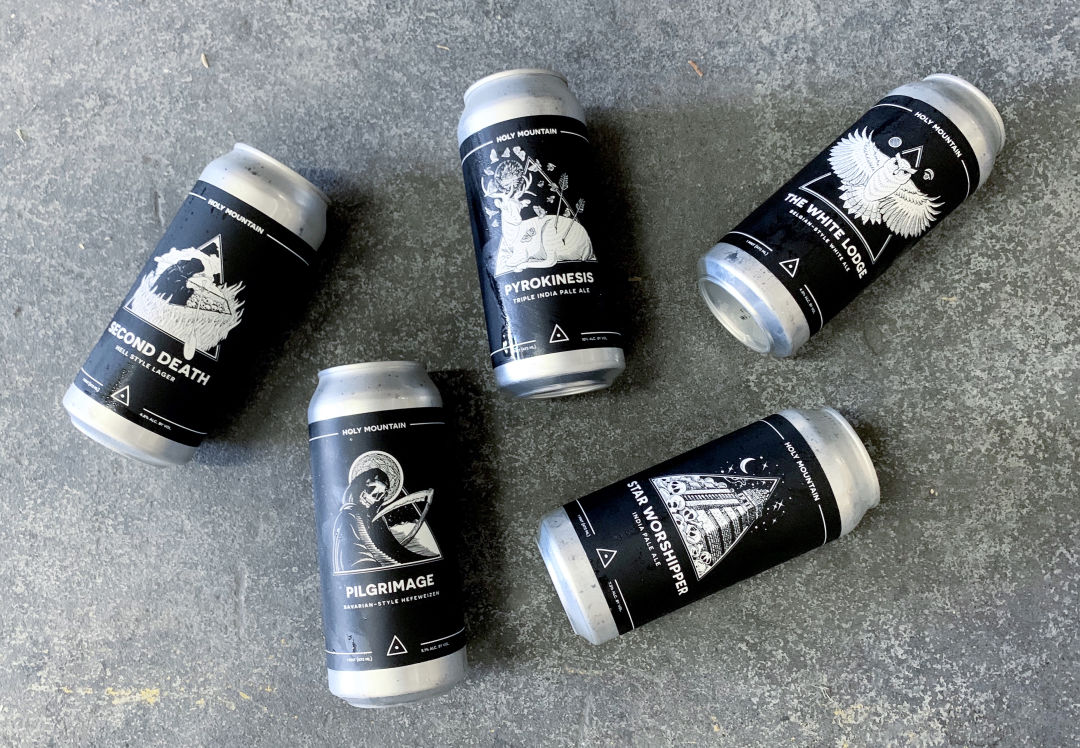
Holy Mountain's cultic branding now comes by the can.
Image: Courtesy Mike Murphy
Old Stove Brewing Company
When the brewery set up its broad tables in Pike Place Market’s newish MarketFront wing, Seattle instantly gained an essential destination for accessible pints consumed in the heart of a Seattle institution, against a backdrop of waterfront and slowly turning Great Wheel. Like many a brewery in these pandemic times, reservations and now a waitlist have replaced the art of hovering over nearly finished glasses in hopes of a seat.
Optimism Brewing Company
The vast window-lined quarters, the ample seating, the broad range of both beer and dogs, the play area (currently closed), the bring-your-own-food policy—Capitol Hill’s Optimism Brewing is, in a neighborhood filed with hangouts, a bona fide third place. Before the pandemic set in, it wasn’t uncommon to witness toddlers blowing out birthday candles while parents toast the occasion (and the fact that they’re not at Chuck E. Cheese) with glasses of Belgian-style wit ale or Moxee IPA. The brewery currently requires reservations to reinforce social distancing, and tries to honor specific requests like seats outdoors, or proximity to a power outlet.
Pike Brewing Company
One of Seattle’s craft brewing stalwarts serves solid pub fare in a rambling space that wraps around brewery operations. On tap: a mix of Pike’s classic brews, like the Scotch-style Kilt Lifter and XXXXX Stout, and less-common pours, from small-batch IPAs to Belgian-style tripels. The brewpub reopened in July but Pike's beer pours all over town—and cans crop up in grocery stores.
Standard Brewing
An expansion transformed Standard Brewing from a minuscule brewery into one that’s merely small, but sour, funky dimensions loom large in its excellent beer. Drinkers who don’t dig these barnyard notes can lean into the light lagers or roasty stouts; during the pandemic, owner Justin Gerardy even introduced some four-packs of cans. The Central District taproom also serves cocktails and a pubby menu of snacks, tacos, and panini, and possesses one of the neighborhood’s best patios—covered, heated, and fringed with copious bamboo.
South Seattle
Future Primitive Brewing
A group of Seattle beer veterans revived the former home of Big Al Brewing in White Center, including brewer Kevin Watson, an alum of Elysian and Allagash. Watson’s downright scholarly about beer, particularly German styles, but that doesn’t mean this bi-level space traffics in the arcane. Future Primitive’s taps dispense myriad IPAs, plus plenty of lagers, stouts, pale ales…nothing academic, exactly—just textbook perfect.
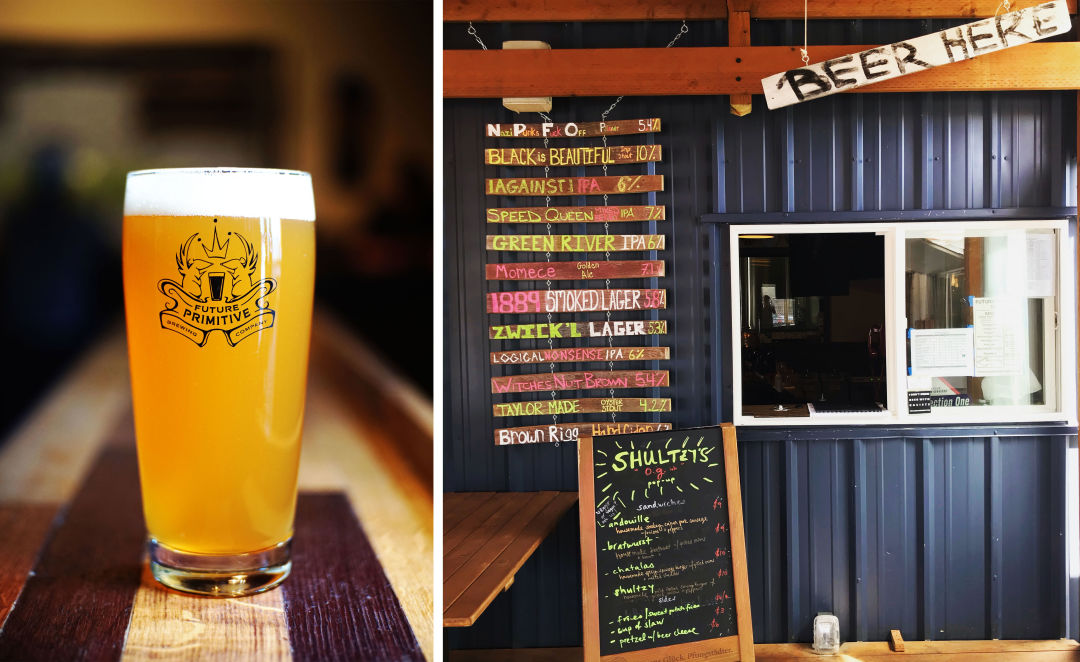
An IPA among many at Future Primitive Brewing.
Georgetown Brewing Company
When Seattle bars started pouring Manny’s in the drinking dark ages of 2003, every additional tap handle implanted craft beer more firmly in our collective psyche. Now it, and sibling brews like Bodhizafa IPA, are so ubiquitous—on tap or, since 2017, in cans—that drinking Georgetown is practically a form of civic engagement. Such status couldn’t go to a more deserving large brewery—never showing off, always satisfying.
Ghostfish Brewing Company
Beer stripped of gluten’s heft usually has distinct flavor notes of “why bother.” But Ghostfish Brewing leans into the charms of malted rice, buckwheat, and especially millet to brew various IPAs, not to mention stouts, saisons, and gose. It’s all completely sans gluten, and yet tasty enough to please traditional beer drinkers. That’s probably why you’ll see Ghostfish beer all over town, and in widely available cans, but the SoDo taproom serves limited releases (like an apricot sour and a salted caramel–coconut brown ale) plus a pub menu that is, of course, totally gluten free.
Lowercase Brewing
The taproom in Georgetown wins on so many fronts—rustic living room vibe, light-strung patio, a newly installed cask beer engine, and superior snacks, like Umami Kushi’s great okazu pan. And yet beer this polished, and balanced, would be worth a trip even to the barest-boned of taprooms—or anywhere that sells their cans—from the endless summertime Mexican lager to an Italian take (which is to say, dry hopped) on pilsner.
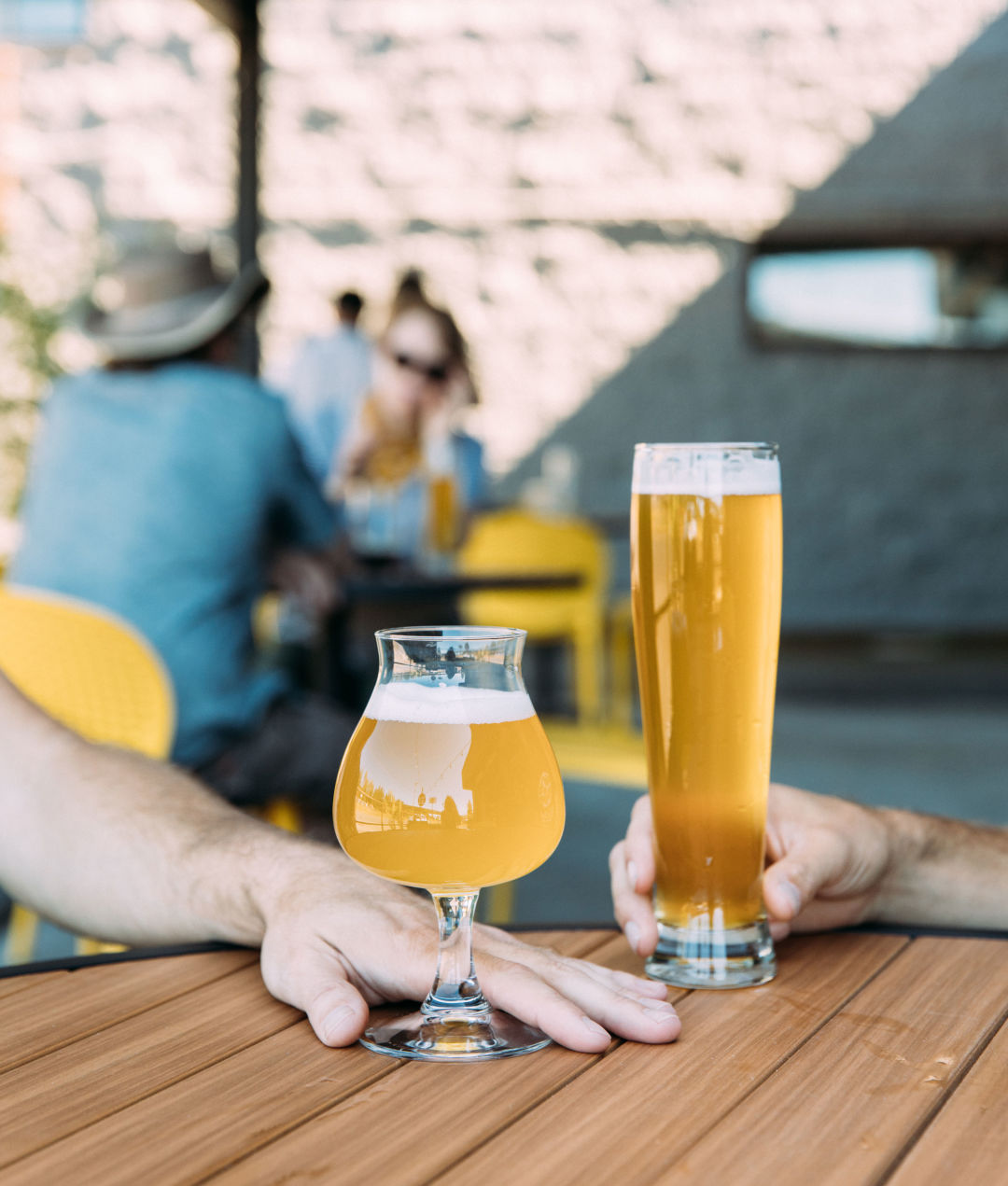
Lowercase Brewing boasts a clean, well-lighted patio. And some internationally inclined lagers.
Machine House Brewery
For seven years, UK-born owner Bill Arnott’s traditional English-style cask ales—hand pumped, served between 50 and 55 degrees, and faintly carbonated—have quietly held their own against constant trendy sea changes. Whether you drink in the cavernous Georgetown brewery or from a bottle (or a 5-liter boxed beer situation), focus should land on the beer. In a city where cool gloom persists nine months of the year, a brew like the elegant Best Bitter is very easy to focus on.
Perihelion Brewery
Beacon Hill’s neighborly brewery could lure people in on charm alone: the old brick storefront, the patio with its table-size firepits illuminated by a string of lights. Then there’s the beer, everything from the lightest lager to old world styles like braggot or roggenbier, and a food menu of burgers, sandwiches, and rotating specials, all way better than what you were expecting.
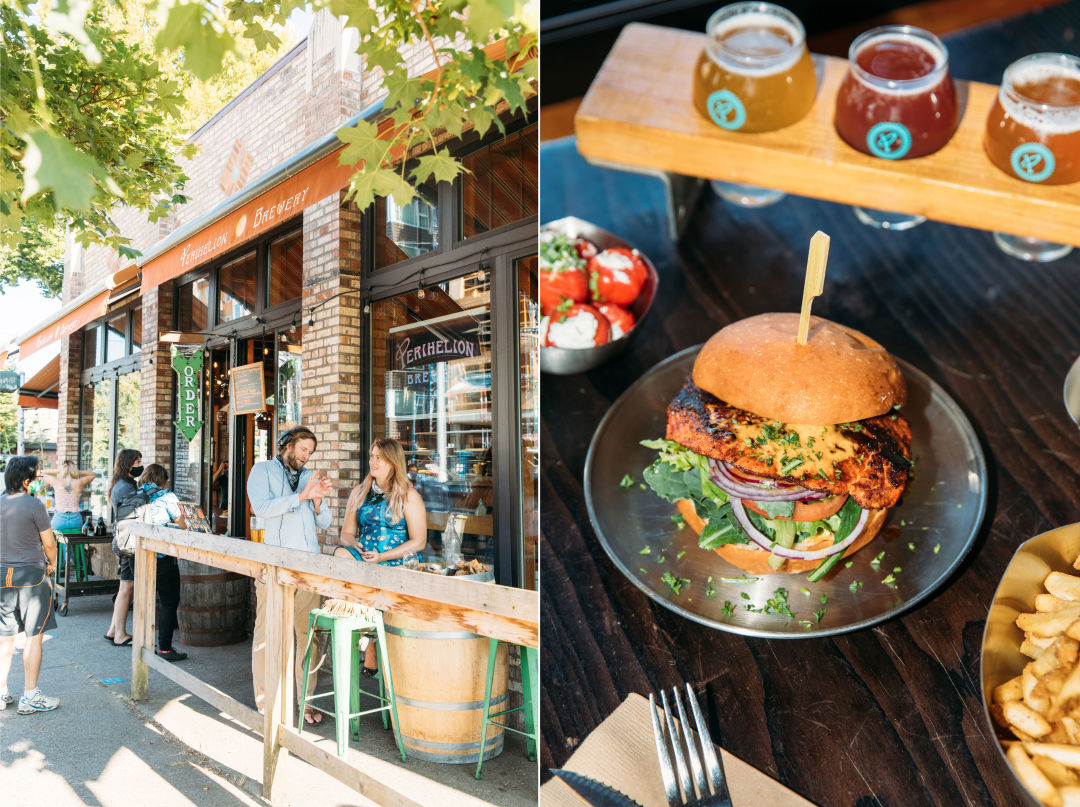
Perihelion's beer runs the gamut from light lagers to old-school European styles.
Seapine Brewing Company
SoDo's Seapine can be tricky to write about. It has no gimmick, nor even a rigorous focus (here are German styles, IPAs, assorted digressions). It’s not especially big, nor especially boutique. Most of its beers—a definitive pilsner, an IPA like a citrus grove—are staples, not novelties. Yet you frequently see this unassuming brewery on smart tap lists with buzzier brethren—Cloudburst, Holy Mountain. Why? The beer is damn good.

